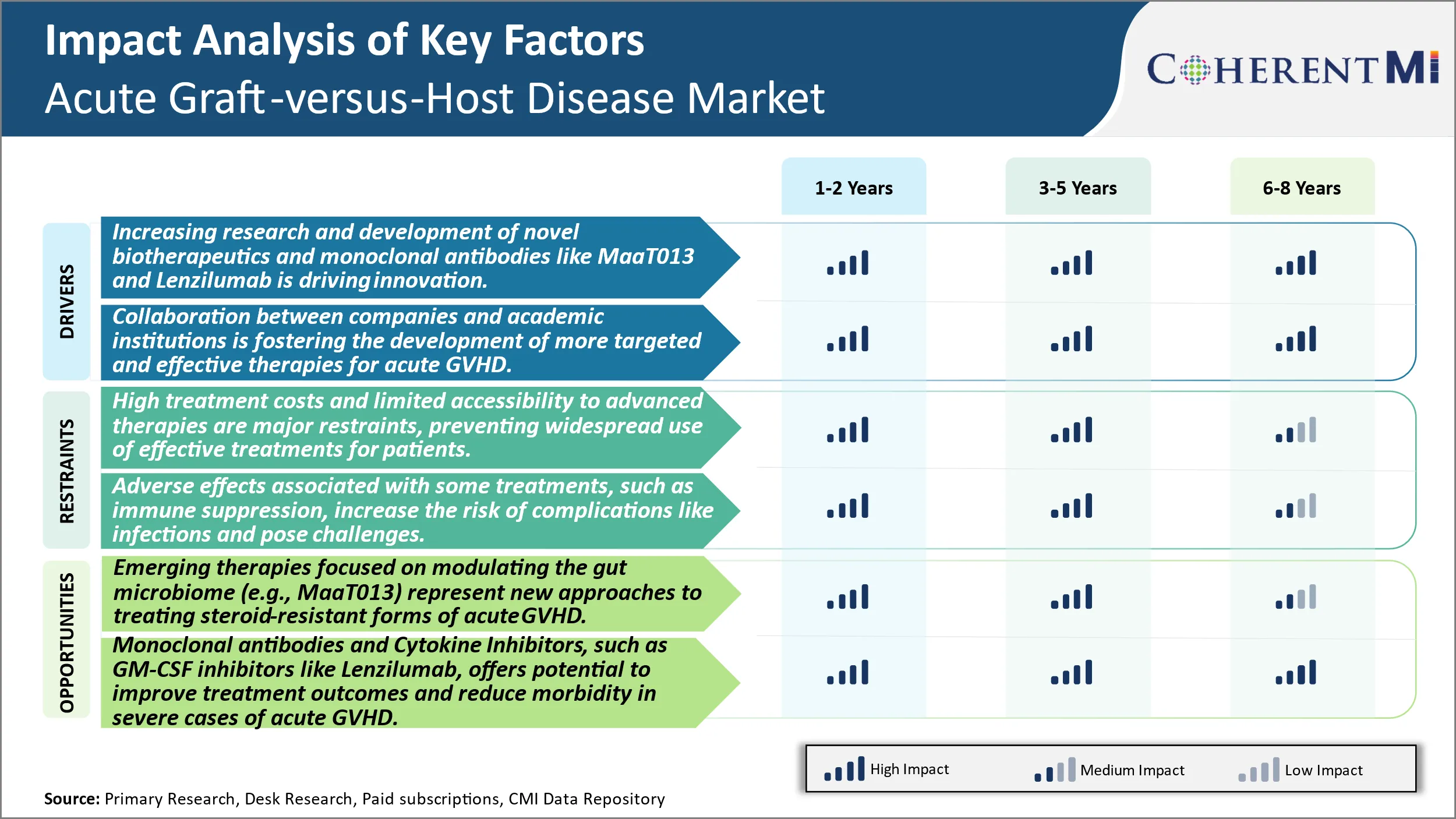Acute Graft-versus-Host Disease Market Trends
Market Driver - Increasing Research and Development of Novel Biotherapeutics and Monoclonal Antibodies Such as Maat013 and Lenzilumab Is Driving Innovation in the Treatment of Acute GVHD.
MaaT Pharma's lead investigational medicinal product, MaaT013, is a microbiome ecosystem therapy that aims to restore a healthy gut microbiome in order to aid in regulating the dysbiotic gut environment often seen in acute GVHD patients. Initial results from Phase 1/2 clinical trials investigating the safety and efficacy of MaaT013 have been encouraging, demonstrating a favorable safety profile as well as signals of clinical activity. The company continues to advance this first-in-class candidate through ongoing trials to further evaluate its potential as a differentiated treatment option for acute GVHD patients. Lenzilumab, a humoral granulocyte colony-stimulating factor neutralizing monoclonal antibody being developed by Humanigen, has also shown early promise in mitigating the incidence and severity of acute GVHD in clinical studies to date. As lenzilumab's mechanism of action targets a key pathway involved in the allogenic response driving acute GVHD, it represents another novel biological approach entering late-stage trials for this patient population.
Continued progress in areas like characterization of immunological pathways, microbiome research, and translational analysis techniques are allowing researchers to gain deeper insights into the complex pathophysiology of acute GVHD. This is enabling the development of novel therapeutic candidates with more selective mechanisms suited to intervene at specific points in the disease process. The results of ongoing clinical research with biologics like MaaT013 and lenzilumab provide early indicators that targeted approaches may offer improved outcomes over conventional options. As such, sustained investment and effort in biotherapeutics and monoclonal antibody research remains an important driver of innovation in the acute GVHD treatment landscape.
Market Driver- Collaboration Between Companies and Academic Institutions
In order to accelerate the development of more effective therapies for acute GVHD, collaboration between industry and academia has become increasingly important. By joining resources and expertise, collaborative partnerships can help address some of the challenges inherent to GVHD research more efficiently. This includes access to specialized patient populations and samples for studies, as well as the consolidated scientific capabilities required for complex projects involving molecular characterization, systems biology analysis and biomarker identification related to this multi-pathway disease.
For instance, MaaT Pharma has established collaborative investigative teams across major transplantation centers in Europe and the US to advance clinical development of its microbiome-based treatments. This provides dedicated investigator sites with experience in acute GVHD, as well as access to patient cohorts needed for evaluation. Beyond any single company, platforms like the Acute GVHD International Consortium bring together leading researchers across disciplines to foster data and sample sharing, harmonize study protocols, develop best practices, and drive forward collaborative projects not feasible for individual groups.
On the industry side, pharmaceutical alliances and licensing deals also help move more candidates into the clinic. For example, humanigen licensed lenzilumab from its original academic developers based on compelling initial data, allowing for progression into late-stage trials. Such partnerships enable greater combined resources and expertise to be leveraged towards the shared goal of developing sorely needed new treatments for acute GVHD patients. Looking ahead, as multi-omic technologies and computational approaches play an expanding role in GVHD research, active collaborations across academic, government and industry stakeholders will remain indispensable.

Market Challenge - High Treatment Costs and Limited Accessibility to Advanced Therapies are Major Restraints, Preventing Widespread Use of Effective Treatments for Patients with Severe Acute GVHD.
High treatment costs and limited accessibility to advanced therapies are major restraints, preventing widespread use of effective treatments for patients with severe acute GVHD. The current standard of care for acute GVHD involves the off-label use of corticosteroids as the first-line treatment option. However, corticosteroids are effective in treating only approximately 50–70% of initial acute GVHD cases. For patients who do not respond to steroids or for whom steroids are contraindicated, second-line options such as monoclonal antibodies targeting TNFα, IL-2 receptor, or CD25 have significantly high treatment costs ranging from USD 80,000 to USD 200,000 per course. These elevated costs pose a huge financial burden for patients as acute GVHD treatments can require multiple lines of therapy over extended periods. Furthermore, lack of insurance coverage and limited health resources in underdeveloped regions restrict access to these expensive medications for a large patient population worldwide. Unless novel and affordable treatment alternatives are identified, high costs will continue to impede effective management of steroid-resistant acute GVHD.
Market Opportunity – Emerging Therapies to Boost Gut Microbiome Techniques.
Emerging therapies focused on modulating the gut microbiome (e.g., MaaT013) represent new approaches to treating steroid-resistant forms of acute GVHD, opening doors to targeted interventions. Acute GVHD is known to influence the composition of the gut microbiota in allo-HSCT recipients. Therapies aimed at replenishing depleted commensal bacteria through fecal microbiota transplantation or defined bacterial consortia have demonstrated promising clinical responses. MaaT013, an encapsulated formulation of live biotherapeutic products, has received an orphan drug designation from the FDA for treatment of acute GVHD. In a Phase 2 clinical trial, MaaT013 achieved complete response rates of over 60% and durable responses in steroid-refractory patients with acute GVHD. Such novel mechanisms that work via microbiome modulation are expected to yield superior efficacy and safety profiles compared to standard immunosuppressive drugs. If successful in further trials, gut microbiota-based therapies could introduce more affordable treatment options and improve outcomes for acute GVHD.